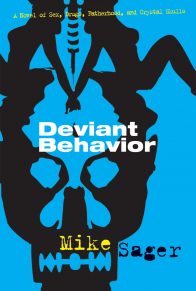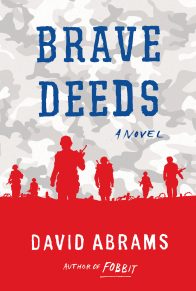They were Fobbits because, at the core, they were nothing but marshmallow. Crack open their chests and in the space where their hearts should be beating with a warrior’s courage and selfless regard, you’d find a pale, gooey center. They cowered like rabbits in their cubicles, busied themselves with PowerPoint briefings to avoid the hazard of Baghdad’s bombs, and steadfastly clung white-knuckled to their desks at Forward Operating Base Triumph. If the FOB was a mother’s skirt, then these soldiers were pressed hard against the pleats, too scared to venture beyond her grasp.
Like the shy, hairy-footed hobbits of Tolkien’s world, they were reluctant to go beyond their shire, bristling with rolls of concertina wire at the borders of the FOB. After all, there were goblins in turbans out there! Or so they convinced themselves.
Supply clerks, motor pool mechanics, cooks, mail sorters, lawyers, trombone players, logisticians: Fobbits, one and all. They didn’t give a shit about appearances.
They were all about making it out of Iraq in one piece.
Of all the Fobbits in the U.S. military task force headquarters at the western edge of Baghdad, Staff Sergeant Chance Gooding Jr. was the Fobbitiest. With his neat-pressed uniform, his lavender-vanilla body wash, and the dust collected around the barrel of his M16 rifle, he was the poster child for the stay-back-stay-safe soldier. The smell of something sweet radiated off his skin–as if he bathed in gingerbread.
Gooding worked in the public affairs office of the Seventh Armored Division, headquartered in one of Saddam Hussein’s marbled palaces. His PAO days were filled with sifting through reports of Significant Activities and then writing press releases about what he had found. His job was to turn the bomb attacks, the sniper kills, the sucking chest wounds, and the dismemberments into something palatable–ideally, something patriotic–that the American public could stomach as they browsed the morning newspaper with their toast and eggs. No one wanted to read: “A soldier was vaporized when his patrol hit an Improvised Explosive Device, his flesh thrown into a nearby tree where it draped like Spanish moss.” But the generals and colonels of the Seventh Armored Division all agreed that the folks back home would appreciate hearing: “A soldier paid the ultimate sacrifice while carrying out his duties in Operation Iraqi Freedom.” Gooding’s weapons were words, his sentences were missiles.
As a Fobbit, Chance Gooding Jr. saw the war through a telescope, the bloody snarl of combat remained at a safe, sanitized distance from his air-conditioned cubicle. And yet, here he was on a FOB at the edge of Baghdad, geographically central to gunfire. To paraphrase the New Testament, he was in the war but he was not of the war.
On the day a soldier was roasted in the fire of an IED in al-Karkh and then, in a separate attack, a suicide bomber rammed into the back of an Abrams tank, Gooding’s deployment clock was at 183 days with another 182 days to go (plus or minus 60 days, depending on extension orders, which could come from the Pentagon at any minute, triggering an increase in suicide attempts, raids on the stash of contraband vodka concealed behind the false wall of a certain NCO’s wall locker, and furious bouts of masturbation). Halfway there. The tipping point. The downhill slide.
Staff Sergeant Gooding was a career soldier with ten-plus years in Uncle Sam’s Army, but this was the first time he’d set foot on the soil of a combat zone. Like the majority of Fobbits, this filled him with equal parts dread and annoyance–fear of being killed at any moment, yes; but also irritation at the fact that he was now on what felt like a yearlong camping trip with all the comforts of home (flush toilets, cable TV, sand-free bedsheets) stripped away. Going to war could be a real pain in the ass.
The infantry grunts–the ones in the wrinkled desert camouflage uniforms, the ones with worry and fear knotting the tight landscape of their foreheads–had nothing but scorn for soldiers like Gooding. To be a “Fobbit” or “Fobber” or “Fob Dog” was the same as calling someone a dickless, lily-livered desk jockey back in the States. In another war, REMF was the preferred term . . . but now, in this modern asymmetric theater of operations, there was no “rear” echelon elite sitting in their motherfucking safe-from-harm shelter.
But, hey, that was okay by them. The Fobbits told themselves, broken-record style, they Just. Did Not. Give. A Shit.
They were all Fobbits, everyone who worked in this palace–with the exception of a few foolhardy officers gunning for promotion who grabbed every opportunity to ride on patrols to water treatment plants, school renovations, and neighborhood council meetings in the Baghdad suburbs. Those officers didn’t really count–they maintained a desk at Task Force Baghdad Headquarters, but you could hardly call them Fobbits. They were ghosts, gone outside the wire more often than not (and making damn sure everyone saw them depart, slurping loud from travel mugs of coffee, uniforms clinking and whickering, a patchwork of 550 cord and carabiners and duct tape).
Everyone else? Solid-to-the-core Fobbits who kept a wary distance from the door-kickers when they came into the chow hall smelling of sweat, road dust, and, occasionally, blood.
Let the door-kickers ride around Baghdad in their armor-skinned Humvees getting pelted with rocks from pissed-off hajjis. Let them dodge the roadside bombs that ripped limbs from sockets and spread guts like fiery paste across the pavement. As for Fobbits? No thanks! They were just fine with their three hots and a cot. The Fobbit life is the life for me, they’d singsong to each other with sly winks.
“Don’t wanna be no bullet sponge,” said Private First Class Simon Semple.
“Oh, hell, no,” agreed Private First Class Allison Andersen. She stuck her forefinger in her mouth and sucked with cheek-collapsing vigor because she was, at the time, eating a Ding Dong cupcake and the broiling Baghdad heat had melted the frosting onto her hand, the corners of her lips, and the tip of her chin. She was back in the cool oasis of the palace now but her skin still throbbed from the 110-degree temperatures outside, which she’d had to endure on the half-mile walk between the dining facility and headquarters. The heat was a bitch and she wondered again why they couldn’t just build a tunnel between the two places. For that matter, they should just dig tunnels everywhere, make this whole FOB a network of connected passageways so they could go around like moles and not come up until after the sun went down.
Pfc Semple watched Pfc Andersen suck the Ding Dong off her finger and felt the stirrings of a hard-on. Damn that girl!
Semple and Andersen had twice engaged in against-regulation, punishable by Uniform Code of Military Justice sex: once in a Porta-Potty in a remote corner of the FOB, sloshing the toilet to and fro and mashing their lips together to stifle their orgasms; the second time on guard duty shortly after midnight when the moon was waning and no one could see them thumping around the guard shack at the opening in the coils of concertina wire around the motor pool. That time hadn’t really counted, though–it was coitus interruptus because insurgents picked that particular night to send four mortars raining down on the FOB and the two horny privates quickly disengaged, clapped their Kevlars back on their heads, grabbed their M16s, and sought shelter in a concrete bunker thinking, oh, sweet Jesus this was the fucking end, not just the end of fucking. But then the mortars stopped, the all-clear siren blew, and the privates stood up, brushed themselves off, and, too embarrassed to look each other in the eye, finished their guard duty in silence.
Semple and Andersen worked in the division’s G-1 Casualty Section and were in charge of cataloguing the dead. They sat at their desks in headquarters and waited for e-mails to pop into their in-boxes, announcing the serious injury or death of another soldier who’d been scythed by the Grim Reaper while out on patrol. The reports came to them in capital letters, shouting in military jargon:
SOLDIER ON MOUNTED PATROL TRAVELING IN VICINITY OF AL-KARKH WATER TREATMENT PLANT FLAGGED DOWN BY IRAQI CITIZEN CLAIMING AN IED 200 METERS AHEAD. SSG HARDING AND TWO OTHER MEMBERS OF THE PATROL DISMOUNTED M1114 TO SEARCH FOR IED EVIDENCE. TWO ADDITIONAL SOLDIERS SEARCHED ADJACENT FIELDS FOR WIRES, BAGS OF GARBAGE, ANIMAL CORPSES, ETC. INDICATING LOCATION OF IED. SSG HARDING ALSO WALKED FORWARD, BUT REMAINED ON THE ROAD. IED WAS ONLY 30 METERS AHEAD OF SOLDIERS. AS TEAM MOVED FORWARD, IED EXPLODED, CAUSING IMMEDIATE AMPUTATION OF SSG HARDING’s FOUR LIMBS. FRAGMENTS OF IED ALSO PENETRATED SSG HARDING’s HELMET, RESULTING IN MASSIVE HEAD INJURY AND SUBSEQUENT DEATH. UNIT CONDUCTED IMMEDIATE CORDON AND SEARCH FOLLOWING THE ATTACK TO FIND RESPONSIBLE PARTY OR PARTIES AND DETAINED FOR FURTHER QUESTIONING ONE POSSIBLE WITNESS, THE INDIVIDUAL WHO ORIGINALLY WARNED THEM ABOUT THE IED.
When the e-mails with their wounds and smoldering body parts arrived in their in-boxes, it was up to Semple and Andersen to place a call to the Medical Treatment Facility that had received the casualty and verify a U.S. military doctor had officially determined the body was indeed dead. Until a doctor put his stethoscope on that blackened, suppurating chest and gave a tight, nauseous nod, it didn’t matter who was weeping and wailing over the corpse of Staff Sergeant Harding–not his loyal and sickened soldiers, not his commanding officer, not his mother, not even the Great White Bwana himself briefly pausing in the Oval Office to brush away a simpatico tear. Without the doctor’s nod, he wasn’t officially dead. And he needed to be officially dead before G-1 Casualty could enter him into the system and begin the transatlantic next-of-kin notification process, which ended with a chaplain and a casualty assistance officer, both of their necks tight and sweating against the collars of their starched dress uniform shirts, standing in the doorway of a home in Hinesville, Georgia, the sun having just swapped places with the moon, a porch swing knocking against the side of the house in the soft evening breeze, the crickets rubbing their legs together and bursting forth in symphonic prelude, the casualty assistance officer clearing his throat and starting his rehearsed speech: “Ma’am, I regret to inform you . . .”
Until then, there was nothing they could do except finish their cupcakes, wipe their fingers, and go back to playing computer solitaire (Semple) and leafing through the pages of an old People magazine (Andersen). Tom Cruise was, after all, in the midst of a very passionate, very weird affair with doe-eyed Katie Holmes. And then there was that vegetable girl, Terri Somebody-or-Other, who nobody had thought to ask before she went into a coma whether or not she would want her plug to be pulled. And Jesus, what was up with Michael Jackson going to court in pajamas? Day-um. America sure was a funny place to look at when you got far enough away, thought Private First Class Andersen.
Hovering unseen at the edge of the G-1 cubicle, Staff Sergeant Chance Gooding watched the two privates toss a cupcake back and forth across the cubicle and thought, Oh, man, this isn’t going to be easy. He needed a word, a simple little word.
Confirmed.
That’s all. Just those two syllables.
His life, at this very moment, depended on it. If, that is, you could call press releases a matter of life and death. Which, at this point in time, he did.
Gooding cleared his throat. “Semple,” he said.
The private turned his head, saw the sergeant standing there, and quickly minimized the solitaire screen.
“Hello, Public Affairs,” he said.
“What can Casualty do for you this fine afternoon?”
“Same old, same old, Semple. Need to know if you have doctor’s confirmation of the latest one–the guy from Second Brigade. The press release is done and ready to send out to the media. I’m just waiting on you guys to give me the go-ahead.”
“Sorry, Sar’nt.” Semple shook his head.
“Why? What’s wrong?”
“Server’s down,” Andersen said, riffling the pages of People a couple of inches from her throat. As if that would cool her skin. She closed her eyes and tried to concentrate on ice cubes, Antarctica, a guy from Alaska she once dated.
“You’ve gotta be kidding me,” Gooding said.
“Wish we was,” Semple said.
“It was fine when I left my cubicle on the other side of the palace.”
“Don’t know what to tell you, Sar’nt. Sandstorm must have come along in the time it took you to walk from there to here. Maybe a mortar hit. Whatever. We’re dead in the water right now.”
Gooding gritted his teeth. Dead. Dying. Done for. By now, death was a way of life for him, a prescribed job skill he performed with automatic finger taps and wrist lifts across his keyboard. Death was just one of the commodities he traded on a daily basis.
It hadn’t always been this way. He could still remember a time, at the start of this deployment, when he’d been a death virgin, cherry unpopped by all the casualty reports and photos of roadside bombings. Long before the Butcher Shop of Baghdad had dulled him to cynicism.
Once, when he was still down in Kuwait, waiting to deploy north to Iraq and join the rest of the division, which had already been in-country for three weeks, a captain from the G-2 Intelligence Section walked up to him in the makeshift Tactical Operations Center and asked, “You PAO?”
Gooding had looked up from the Dickens novel he was reading, then quickly got to his feet, heart pounding. “Yes, ma’am.”
“Thought you should know we just got word from up north. Division took some fatalities earlier this afternoon. A vehicle out on patrol rolled over into a canal in south Baghdad. Two dead on impact. Another one trapped in the wreckage. Two other soldiers jumped in to rescue the vehicle crew but they got swept away. Monsoon season up there is a bitch, apparently. Anyway, last I heard, we’ve got three dead and two missing.”
Gooding had dog-eared a page of A Tale of Two Cities with trembling fingers and said in a hoarse voice, “Thanks, ma’am. I appreciate you letting me know.”
Back then, he’d slumped against the wall, reeling from his first deaths as a public affairs soldier serving in his first war. He pictured the Humvee tipping, tumbling into the water, the two soldiers on the bank shouting, acting on instinct, jumping into the water, misjudging the current, and getting sucked down into the muddy swirl of the Euphrates (in his mind, the canal had become the mighty Euphrates), their mouths trying to snatch air but filling instead with dirty water. He pictured those two soldiers flailing against the pull of the water, soon losing all strength as their lungs filled with the Euphrates, and their limp bodies floating downstream. He had thought about their personnel files quickly being pulled from the division’s records and labeled “Killed In Action,” their ghosts quietly falling out of company formations, their names laser-etched on a memorial plaque back in Georgia.
Not many days and three U.S. KIAs later, Gooding had written in his diary:
February 13: This is how a death is announced. In the midst of the hum and buzz of idle boredom in the Division Tactical Operations Center, you hear one officer, bent over the back pages of The Stars and Stripes, ask another, “What did you get for 17 Across?” Two people are arguing about which Matrix movie was the best. Another soldier in his early twenties is surfing the Internet looking at engagement rings and wondering aloud what difference a half carat made in the quality and price and–most importantly–a chick’s response to the bling.
Then, like a blade swishing through the air comes a sudden sharp voice from the other side of the room, cutting through the growl-buzz of the generator and the fist-thump of wind against the tent walls. You look over and an NCO is pressing a telephone receiver tighter against his ear and saying, ‘repeat that last transmission. What did you say?” He waves his hand at another NCO to get him a pen, whereupon he scribbles on an index card. Two or three others cluster near him, heads pressed in a tight circle. One head pops up and catches the eye of the battle captain sitting in his leather office chair at the front of the room. He rises from the chair–he’d been watching a NASCAR race on the TV–and walks over to the growing knot of huddled heads.
At this point, something like cold fear creeps around your heart like icy vines. The information on the index card is read back into the phone for confirmation, then the battle captain grabs the card and strides to the front of the room, yelling, “ATTENTION IN THE DTOC! ATTENTION IN THE DTOC!”
All sound and motion in the tent stops. Someone mutes the NASCAR race. The battle captain reads from the index card: “We have reports of one IED in the vicinity of Scania along the convoy route. One KIA. Battle-damage assessment still being made. That is all.” He reads it as carefully and dispassionately as someone quoting stock market prices, then he turns and writes the information on a large sheet of paper taped to the wall at the front of the room where all significant activities–the loss of an M16, the arrival/departure of a convoy, the publication of an operations order–are recorded.
As you watch him write with the magic marker, the conversation-buzz of the room gradually returns to its former volume. Some drop their heads in sorrow, shaking them back and forth as if that will counteract the loss and bring the KIA back to life, or at least change his status to WIA. But the magic marker ink is permanent, seared there by the heat of an IED blast. No wounds can be reversed. The battle captain returns to his leather chair. A couple of officers return to their crossword puzzle. Someone turns up the volume on the TV and the NASCAR race resumes.
But now, five months later, death was a matter of course, one more task in a day already filled with a heavy workload. Gooding could type his KIA press releases blindfolded. If, that is, he could get these two cupcake-smeared clerks in G-1 to cooperate and give him the nod.
Gooding ground his teeth. CNN was breathing down his neck, calling every ten minutes to ask about the explosion half the people in al-Karkh saw and nearly everyone heard, the deep thud rippling through the neighborhoods, the smoke pluming like a gray finger. The producers had called an hour ago and said they already had a cameraman on the site who was telling them there were U.S. casualties. The rest of the meat-wagon media were right on CNN’s heels. By the time he walked back to his cubicle, Gooding could expect to see three or four e-mails in his in-box from the New York Times, NBC, and Reuters. They wanted details. They had deadlines. They needed confirmation of death.
“Not much we can do right now, Sar’nt,” said Semple, clicking uselessly at his e-mail in-box. “Dust storm’s fucking up the whole computer network from here to Basra.”
“CNN just announced this guy’s death and they have footage of a body wearing a U.S. uniform being hauled from the blast site on a stretcher.”
“You know the drill, Sar’nt,” Semple said. “He ain’t dead until we get the e-mail from the docs at Camp Bucca saying he’s dead.”
“And you can’t pick up the phone and call?”
“C’mon, Sar’nt. You know it has to be official and in writing. We can’t go vocal on casualty confirmation.”
Semple looked at Andersen to see if she’d agree with him and get this sergeant off their ass. She had stopped sucking her fingers and was now picking at a piece of dried lunch caught on the ample breast of her DCUs. She scraped her nail back and forth right where the nipple would be beneath the uniform, the brown T-shirt, and the bra. Sweet Jesus have mercy!
When he had the chance, Semple was going to tell her about a new Porta-Potty he’d seen by the chapel where no one went except Wednesday nights and Sunday mornings. He was going to make his invitation smooth as chocolate milk and maybe she’d reconsider her previous reluctance for toilet sex.
For now, he couldn’t say anything because the sergeant from PAO was still standing there.
“So,” Gooding said, “even though you know he’s dead and I know he’s dead and by now his momma probably knows he’s dead, the dude’s not really dead, is that what you’re telling me?”
Semple leveled a flat gaze at Gooding and clicked at his equally dead in-box. “He ain’t officially dead yet.”
“What about unofficially?”
“Unofficially, yeah. He’s road meat. But if anyone asks, you didn’t hear it from me.”
Gooding was already gone. He’d spun on his heel and started speedwalking back to his cubicle by the time the word meat had fallen off Semple’s lips. “Day-um,” Andersen said.
“Ole sarge needs to slow hisself down,” Semple said.
“Guy’s gonna have a heart attack if he starts taking this shit too seriously.”
“Yeah. He needs to pace himself. We still got another six months to go in this shit hole.”
“Ticktock, ticktock.”
“Why you always gotta bring up the deployment clock, huh?”
“What else we gonna talk about?” Semple asked. “It’s all one big fuckin” Groundhog Day anyway, so what does it matter?”
“It matters. I’m sick of this shit already.”
Semple snorted. “Your words: pace yourself.”
“Whatever.” Andersen brushed off her breast with wide, hard strokes to dislodge the crumbs, then picked up her People and moved on to Brad Pitt. Semple watched her, crossing his legs to hide his hardness.
“Hey,” he said and Andersen looked up from the magazine. The words Porta-Potty were there on the tip of his tongue, but what he said instead was, “Check the server again.”
Andersen clicked her in-box. “Well, lookee here. It’s back up. Whaddaya think? Should we call him back?”
Semple grinned. “Naw. Let him sweat it out for a little bit longer. Pass me that other cupcake, will ya?”













